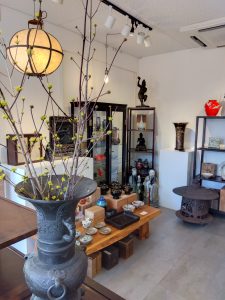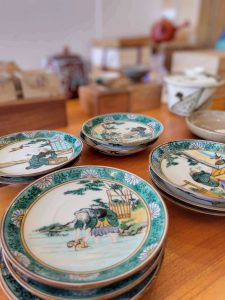知っている人は毎年買っている?(愛知県名古屋市千種区姫池通 骨董買取 古美術風光舎)
2025.01.19
明日は二十四節気の「大寒」。一年で最も寒い頃のはずですが、寒さは和らぐようで、早くも春の足音が聞こえてきそうです。受験生の皆さんにとっては、少し肩の力が抜ける暖かさかもしれませんね。

そんな大寒の日には縁起物の食べ物があるんですがご存知でしょうか。それは…「大寒の卵」。
え?卵?って感じですが…
とはいえ、スーパーではなかなか出会えないのがこの「大寒の卵」。なぜならスーパーの卵には賞味期限は書いてあっても、いつ産んだものかはなかなかわからないものですので。
「大寒卵」とは、大寒の初日に生まれた卵のことを言うそうです。今では技術の進歩により、温度管理された鶏舎で一年中卵を産むことができるようになりましたが、昔はそうではありませんでした。鶏は本来、冬には卵を産まない生き物。ですので昔は、鶏は冬前に餌をたくさん食べて、水分はあまりとらず栄養を蓄え、寒い時期には卵を産まず、じっとしていたのだそう。そのため、寒い時期に卵を産むことは稀だったようです。
そのため、大寒の頃に生まれた卵には栄養がぎゅっと凝縮され、ほかの時期と比べて1個あたりの栄養価が高かったと言われているそうです。
そうして、大寒に生まれる卵は「大寒卵」と呼ばれ、縁起物として扱われるようになった…と。大寒卵は栄養が豊富なため「健康運」や「無病息災」、また卵の黄身の黄色が特に濃くなることから「金運」の願いが込められており、縁起物として最近ではプレゼントされる方も多いそうですよ。
卵は常に冷蔵庫にないとちょっと不安になる食材ですが、たまご料理などの食レポなどに使われる「ふわふわ」という言葉がありますが、じつは江戸時代から普通に使われていた表現なのだそう。しかも『たまご料理』の表現で。いかにも現代語っぽい言葉なのになかなか面白いですね。
そしてなんと「たまごふわふわ」ズバリな名前の江戸時代の料理がありました。東海道のちょうど真ん中にある静岡県の袋井市。江戸時代から伝わる「たまごふわふわ」という料理が、ご当地グルメであるそうです。茶碗蒸しとはまた違った、独特の味わいを持ち、上品なおいしさなのだそうで、袋井宿で朝ごはんに出されていたとか。「東海道中膝栗毛」にも登場するそうで、新鮮組局長の近藤勇の好物でもあったといわれます。
この料理のおかげで、「ふわふわ」という表現は、特に『たまご料理の食感』としてメジャーな形容詞になったのだそうです。
「大寒卵」をご存知の方は購入していることと思いますが、今回このブログをきっかけに知った方は、ぜひ来年購入してみてください。
ちなみに今年の大寒は1月20日(月)ですが、大寒から2月2日(日)の節分までの15日間が「大寒期」とのことです。まだまだ寒い日もありそうですので、たくさんの栄養と睡眠で体調を整えていきましょう。
ではでは、また。(スタッフT)

Tomorrow is the 24th day of the year, “Daikan”. It is supposed to be the coldest time of the year, but the cold seems to be easing and we can already hear the footsteps of spring. For students preparing for exams, it may be the warmth that relaxes your shoulders a little.
Do you know that there is a food that brings good luck on the day of “Daikan”? It is… “Daikan no Tamago (Eggs for the Great Cold)”.
What? Eggs? It sounds like “eggs”, but…
However, it is very difficult to find “eggs for the big cold” in supermarkets. This is because even though supermarket eggs have an expiration date on them, it is hard to tell when they were laid.
Daikan tamago” refers to eggs laid on the first day of the coldest day of the year. Nowadays, advances in technology have made it possible to lay eggs all year round in temperature-controlled henhouses, but this was not the case in the past. Chickens are essentially creatures that do not lay eggs in the winter. So in the old days, chickens ate a lot of food before winter, stored nutrients without much water, and stayed still, not laying eggs in the cold season. Therefore, it was rare for them to lay eggs during the cold season.
Therefore, it is said that the eggs born around the time of the “big cold” were packed with nutrients and had higher nutritional value per egg than those born at other times of the year.
Thus, eggs born during the “big cold” period are called “big cold eggs” and are regarded as a good luck charm…. Because they are rich in nutrients, they are believed to bring “good health” and “good health,” and because the yolk of the egg is particularly dark yellow, they are believed to bring “good luck in money.
Eggs are an ingredient that one always has to have in the refrigerator to feel a little uneasy, but the word “fluffy” used for egg dishes has actually been a common expression since the Edo period. It is a common expression for “egg dishes. It is quite interesting that the word is used in such a modern way.
And what a surprise, there was a dish from the Edo period with the exact name “Tamago Fluffy. Fukuroi City in Shizuoka Prefecture is located right in the middle of the Tokaido Highway. A dish called “Tamagofuwafuwa” that has been handed down since the Edo period is said to be a local gourmet dish. It is said to have a unique flavor different from chawanmushi, and to have been served for breakfast at Fukuroi-juku. It is said to have appeared in “Tokaido Chu Hizakurige,” and was also a favorite dish of Isamu Kondo, the director of the Shinsengumi Bureau.
Thanks to this dish, the expression “fluffy” became a major adjective, especially for the texture of egg dishes.
If you are familiar with “Daikan Tamago”, you have probably already purchased it, but if you learned about it through this blog, please try to purchase it next year.
Incidentally, this year’s “Daikan” is on January 20 (Mon.), and the “Daikan period” is the 15 days from Daikan to Setsubun on February 2 (Sun.). There may still be some cold days ahead, but let’s keep ourselves in good shape with lots of nutrition and sleep.
See you soon. (Staff T)
*****************
ご実家の整理やお片付けなどをされている方のご相談などが多くございます。
お片付けなどくれぐれもご無理のないようになさってくださいませ。
風光舎では古美術品や骨董品の他にも絵画や宝石、趣味のお品など様々なジャンルのものを買受しております。
お片付けをされていて、こういうものでもいいのかしらと迷われているものでも、どうぞお気軽にご相談下さいませ。
また風光舎は、出張買取も強化しております。ご近所はもちろん、愛知県内、岐阜県、三重県その他の県へも出張いたします。
まずは、お電話お待ちしております。
愛知県名古屋市千種区姫池通
骨董 買取【古美術 風光舎 名古屋店】
TEL052(734)8444
10:00-18:00 OPEN
#出張買取#骨董#古美術#骨董品#絵画#版画#茶道具#刀剣#彫刻

